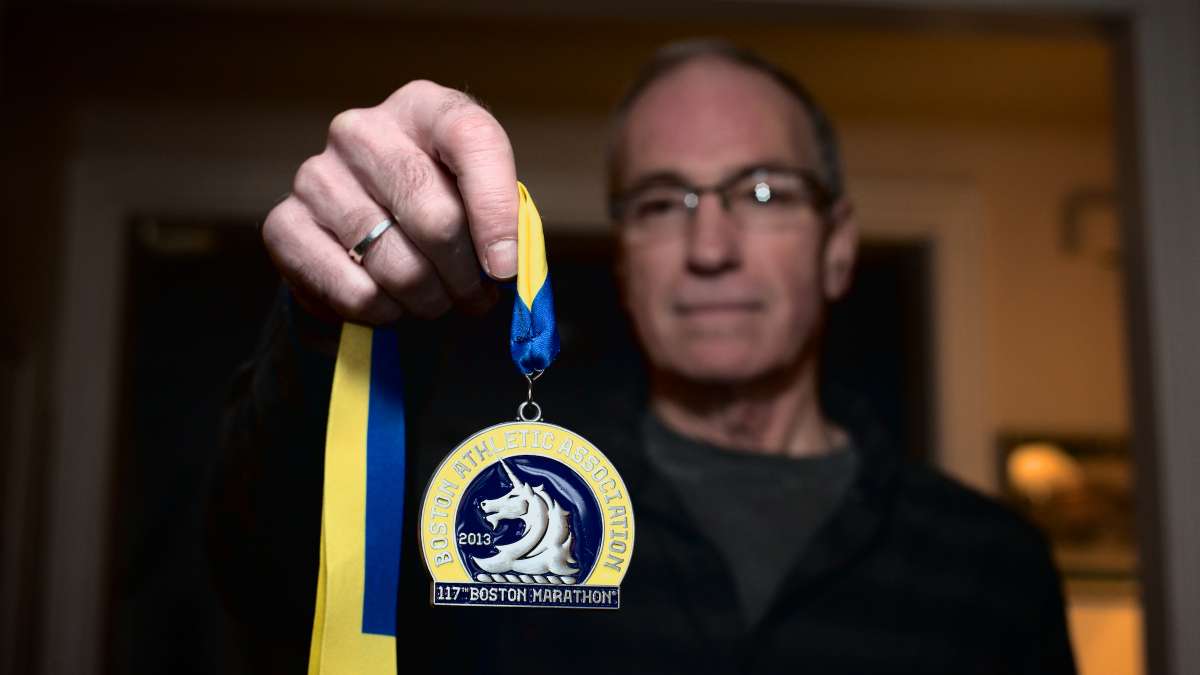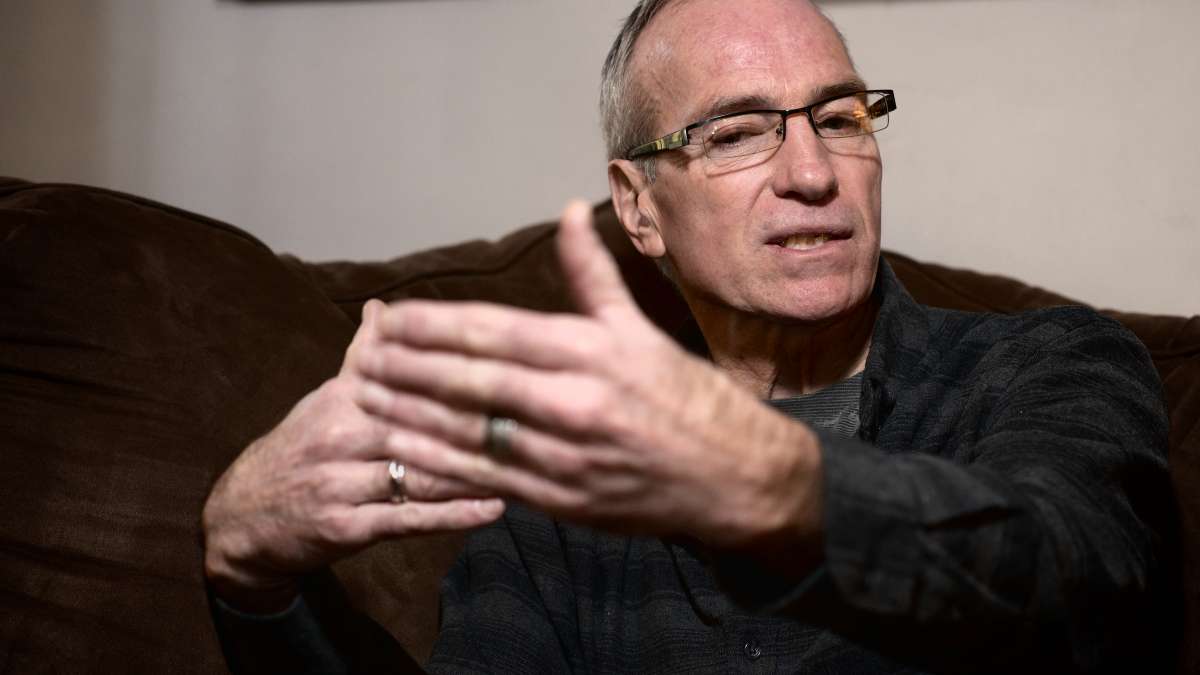Ending anti-gay therapy requires new legislation
-

Randy Clever holds his medal from the 2013 Boston Marathon. He will return for the April 21 race. (Bas Slabbers/for NewsWorks)
-

-

-

-

-

-

On Saturday, March 29, an anti-gay group called Courage hosted an event in Philadelphia to promote the use of conversion therapy, which is an ineffective and harmful practice that attempts to eliminate or suppress an individual’s sexual desire and attraction to members of the same sex.
Currently the subject of much debate, the therapy encompasses a range of measures, including behavioral methods, abstinence training, psychoanalysis and biological interventions. Such measures are obviously unnecessary. Same-sex attraction is a natural variation of human sexuality and does not require “therapeutic” change — a position supported by mainstream organizations in the field of psychology, including the American Psychological Association (APA).
These measures are also unsettling because they promote the deceptive view that same-sex attraction is deviant and immoral. In this way, they can to cause serious harm to people, because they send the message that attraction to members of the same sex is inherently wrong when that is not the case.
In fact, various studies indicate that individuals who have endured this practice experience considerable psychological, social, interpersonal, and even spiritual harm. The APA also has noted negative social and emotional consequences including anxiety and depression, among others. Significantly, the harms associated with conversion therapy are not limited to former patients. Because its negative message reinforces detrimental views about same-sex attraction that fuel stigma and discrimination, it exacts a high cost on society as well.
In addition, these studies also have indicated substantial problems with conversion therapy proponents’ claims about the effectiveness of the practice, citing serious methodological problems with their research. In spite of this, Courage and numerous other groups aggressively advocate for this therapy and for the misguided position that same-sex attraction is a conscious choice, and in some instances, even a pathology or a sin, and that it can and should be resisted.
A growing concern
Admittedly, it might be hard to imagine this support currently posing a serious problem, given that both the practice and the logic behind it are obviously refuted by professional health organizations and outdated by 2014 standards. However, recent years have seen a steady increase in the promotion of conversion therapy, especially for minors, creating a growing concern in the health professions and prompting widespread public condemnation. It also has created concern in legislatures across the country.
For example, in December 2013, several members of the U.S. House of Representatives introduced a concurrent resolution expressing that conversion therapy is harmful and should be prohibited from being practiced on minors. The resolution also encourages states to take steps to protect minors from the practice. Some states have already taken such steps and introduced new laws to address and prevent the numerous harms associated with conversion therapy. Both California and New Jersey have already passed such laws and prohibit mental health providers from engaging in the practice with minor patients. Florida, Illinois, Maryland, Massachusetts, Minnesota, New York, Ohio, Pennsylvania, Washington, and the District of Columbia have all proposed similar statutory bans. Maryland lawmakers recently withdrew their proposed bill after its advocates decided to pursue regulatory oversight of the controversial practice instead.
Notwithstanding this decision, the general increase in legislative activity on this matter seems to show that legislative condemnation not only sends a powerful public statement, but also represents a viable solution for regulating conversion therapy.
In fact, at this time, legislation regulating conversion therapy not only seems viable but also necessary, in light of the inadequacy of other courses of action, such as litigation and regulatory oversight. Though these alternatives may seem somewhat promising, considering the misinformation conversion therapy practitioners provide to patients and the subsequent harms they inflict, they present a number of obstacles that former conversion therapy patients would have to overcome to be successful on their claims.
For instance, because the practice varies considerably, determining the standard of care a conversion therapy practitioner owes a patient is difficult. This makes it challenging for former patients to demonstrate to a judge or a professional licensing board that a violation occurred. In addition, former patients would have to defeat various defenses asserted by practitioners in court, or alternatively, prevail in a peer review of their complaint in a regulatory setting, which the bias of professional colleagues may negatively influence.
State actions good, but not enough
Aside from these hurdles, there are also several other reasons these alternatives represent an inadequate response to conversion therapy. First, they take place after the harm has already occurred. Though the cumulative effect of complaints may deter practitioners from engaging in the practice, legislation banning the practice altogether is probably better suited toward this end, because it guarantees that practitioners will be held accountable.
Second, victims of conversion therapy may be reluctant to bring complaints against their former therapist. They may be afraid of being stigmatized for seeing a therapist, of having their personal lives divulged in a public forum, and of breaching the closeness that develops between patient and therapist.
Finally, some patients may also be concerned about revealing their sexuality, which would most likely happen if they were to file a complaint in court or with a professional licensing board.
In light of these considerations, it is clear that litigation and regulatory oversight do not go far enough to address the practice of conversion therapy. However, legislation can account for the shortcomings of these alternative measures. It can also supplement and reinforce existing measures, such as professional licensing regulations, by being more explicit and by providing for specific disciplinary action for practitioners who violate the law.
Enacting such legislation will undoubtedly prove challenging, but advocates and legislators can use growing support for the LGBT civil rights movement to their advantage. Hopefully as more Americans realize people should not have to hide or change who they are, there will be support for a change in the law that reflects this understanding.
—
Andrea C. Anastasi is a J.D. Candidate and Law & Public Policy Scholar at Temple University Beasley School of Law.
WHYY is your source for fact-based, in-depth journalism and information. As a nonprofit organization, we rely on financial support from readers like you. Please give today.

